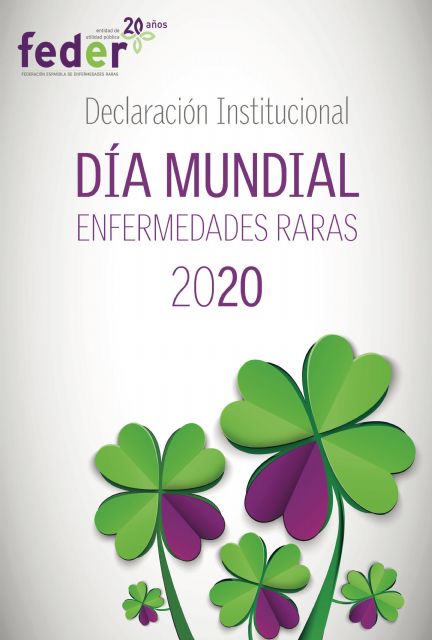The Plenary Session of the City Council of Totana will discuss, in the ordinary session of February, a joint motion to agree on municipal accession to the Institutional Declaration on the occasion of World Rare Disease Day 2020, promoted by the Spanish Federation of Rare Diseases (ERDF).
This proposal advocates supporting each and every one of the claims, demands and values contained in this Institutional Declaration that revolve around research, social transformation and direct attention through services.
In addition, it is requested to urge the Ministry of Health and the Ministry of Health to implement all the actions contemplated in this Institutional Declaration and that contribute to the improvement of the quality of life of people and families living with rare diseases in Spain.
This February 29 is celebrated the World Day of Rare Diseases, which are those pathologies whose prevalence is below 5 per 10,000 inhabitants;
which, considered one by one, affect very few people, but taken as a whole, involve a large part of the citizenship.
Worldwide there are 6,172 rare diseases identified, some chronic, degenerative and genetic in more than 70% of cases;
which appear in children's age in two out of three cases, which entail a great disability in autonomy and put into play the vital prognosis of those who live with them.
Its complexity and low prevalence make it necessary a high specialization and concentration of cases, multidisciplinarity and experience for its attention.
Therefore, the onset of the disease is not always linked to its diagnosis.
Most families with rare diseases have to wait more than 4 years to name it;
and 20% expect more than a decade.
Among the consequences of this delay, there is access to a treatment that slows the progression of pathology, to which only 34% of families have access.
In this context, the associative movement has grown, which has allowed strengthening and promoting research projects and the knowledge of this socio-health reality in society as a whole.
The City of Totana, and more specifically its social and neighborhood fabric, has been characterized in recent years as a solidarity municipality with people with rare diseases and their families.
In a special way, Totana has accompanied and helped the associations that have valued the work carried out by the associations of rare diseases D´Genes and AELIP, which have placed the municipality as a reference in the care of people and families living together with rare diseases.
The Consistory totanero has shown, since 2008, its solidarity, its commitment and adherence with the more than three million people who live with a rare disease in Spain and with the more than 100,000 Murcia who suffer from it.
FEDER wants within the framework of the Institutional Declaration of this year 2020 to involve all agents to commit to this cause and walk together towards a new future that guarantees a model of comprehensive care and social benefits focused on the person and not on the pathology.
It also advocates a future where patients are legitimized and are part of the entire research process as well as a context in which the involvement of society achieves the impulse of a collaborative financing model that leads to duplicate research projects in rare diseases. valid today.
Likewise, we are working for a future where international, state and regional strategies allow real and equitable access to scientific advances in diagnosis and treatment, thus achieving a real impact on the quality of life of services.
In the same way, a future is defended where the experience of the associative movement in services, centers and multidisciplinary attention is supported and recognized by the administration, creating work bridges with other organizations that, for the same purpose, work together in Europe.
Achieving all this, and getting an effective response for people with rare diseases or seeking diagnosis is in the hands of all administrations, politicians, industry, researchers, health professionals, journalists and social media, and so on.
Finally, the motion advocates that together we promote the social transformation that people with infrequent diseases need, but also promote.


